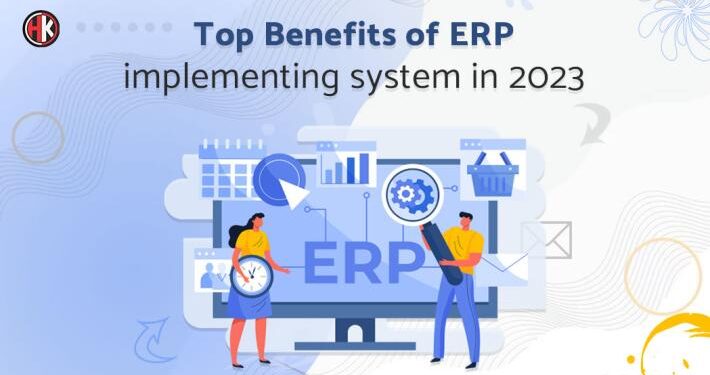In the 2023 business landscape, ERP systems offer transformative solutions to streamline operations and optimize the growth of technology. In this article, we will provide an explanation of ERP software and its crucial features. Additionally, we will dive deep into its advantages and disadvantages.
Whether you are a business owner, a leader, or simply curious to know, an understanding of the power of ERP can greatly enhance the efficiency and effectiveness of your organization. ERP facilitates management across all aspects of your business operations, providing a centralized platform for various processes like finance, HR, manufacturing, supply chain, and customer relationship management.
Make ERP software involves several key steps, including thorough analysis of business requirements, design, development, testing, and implementation. Tailoring the ERP solution to suit the specific needs of the organisation is vital to maximize its benefits. Companies must carefully select an experienced ERP vendor or an in-house team with expertise in software development and business processes.
Now, Let’s Join us on this journey as we clarify ERP and uncover its importance for companies.
What is ERP System?
Enterprise Resource Planning (ERP) is a computer program that greatly enhances business operations. Think of it as a tool that consolidates all aspects of a company operations into one platform. It simplifies tasks such, as procurement, financial management, employee administration, and customer interactions.
Imagine a collection of building blocks each representing a role within the organization. One block symbolizes purchasing, another stands for management, while another represents employee satisfaction. The ERP system intelligently assembles these blocks to ensure operations.
With ERP at play, every team member is well-informed about each other’s responsibilities that Can collaborate effectively. It’s similar to having a trusted partner to keep everything organized and prevent any trouble or oversights.
Advantages of ERP Implementation:
In 2023, the benefits of ERP implementation in organizations will be like magical helpers. They make everything work better and help different teams become super friends, so the business can be happy and make customers smile. Let me tell you some of the best things that happen when ERP is used:
Increase Collaboration
ERP systems also promote team connections, enhancing communication and employee involvement. Through an ERP system, all authorised staff can readily access operational data, gaining insights into the company’s various components and their individual contributions.
This diminishes barriers and facilitates real-time updates on projects, promoting streamlined workflows and financial efficiencies. Moreover, the system’s collaborative features extend beyond organisational boundaries, linking with vital business partners and advancing overall corporate advantages.
Increased Efficiency
A key benefit of using an ERP system is automating manual tasks, freeing up employees for revenue-driven activities, and standardizing common business processes. This efficiency boost improves demand forecasting, cuts production bottlenecks, shortens lead times, and brings transparency to the supply chain. Moreover, it fosters business growth and a competitive edge.
Compliance Assurance
While other advantages may seem less significant, maintaining regulatory compliance is most important for any business. An often underestimated strength of ERP systems is their ability to assist in monitoring industry regulations and changes in compliance.
This ensures that businesses remain updated and aligned with pertinent laws, guidelines, and specifications. In essence, ERP systems offer a proactive approach to staying in line with regulations, which is crucial for sustained professionalism and success.
Enhanced Customer Satisfaction
ERP systems play a crucial role by centralizing customer data, benefiting various departments. This setup enables smooth collaboration among teams, leading to quicker responses, enhanced order accuracy, and better delivery. Sales teams can prioritize nurturing customer connections instead of managing spreadsheets, while marketers can craft targeted campaigns.
Instant Data Updates and Improved Reporting
[1] One major advantage of ERP systems is their role as a strong data hub. By utilizing an ERP system, you can efficiently gather, store, and analyze data from various operational features in a centralized location.
This creates a singular source of accurate information, that promotes enhanced visibility for more strategic decision-making. This centralized data accessibility empowers businesses to obtain real-time insights and generate more valuable reports.
This eliminates the need for multiple spreadsheets or data repositories when comparing departmental functions and allows daily monitoring of aspects such as inventory levels for precise capital control.
Disadvantages of ERP Implementation:
Using ERP systems for a company may have benefits and challenges. But it’s important to think about the following disadvantages to decide if it’s right for the business. Here are some of the disadvantages of erp.:
1. Significant Development Costs:
ERP solutions are complicated and demand a complex and costly development process. Custom-built systems requires a skilled team with extensive expertise, which can escalate costs due to higher hourly wages.
Off-the-shelf ERP systems offer a quicker route, but they also come with high licensing fees. Opting for more affordable solutions often results in limited flexibility, longer customization periods, potential security vulnerabilities, and possible misalignment with business processes.
2. Deploy and Maintain Expenses:
If you find ERP system prices daunting, brace yourself for deployment and maintenance expenses. These involve even greater financial commitments and require additional tech personnel.
Pre-packaged solutions require regular updates, potentially incurring more costs. It’s essential to remember that these investments pay off over time through enhanced overall business efficiency.
3. Training and Skill Development:
The complexity of ERP software demands substantial training for the staff. Grasping the basics takes time and effort, and mastering its full functionality requires even more.
When experienced users exit the company, new hires must invest time to learn the system before becoming fully productive. Providing thorough manuals and training programs can ease this learning curve.
4. Customization Necessity:
Successful ERP implementation hinges on precise customization, from broad adjustments to meticulous fine-tuning. Both off-the-shelf and custom solutions must align with the enterprise’s management structure.
Best Practices for a Smooth ERP Implementation:
Tips for a Smooth ERP Implementation:
- Form a Dedicated Team:
Choose skilled people who can communicate well and work together. Include an skilled developer,project manager, and representatives from key business groups.
- Define Key Goals and KPIs
Understand your objectives for implementing ERP, like improving data analysis, cost tracking, or automation. Create Key Performance Indicators (KPIs) to measure success.
- Develop a Project Management Plan
Plan well, involve stakeholders, assess risks, and schedule regular update meetings.
- Prepare for Data Migration
Set up a team to decide what data to transfer and test the new system gradually.
- Collaborate and Communicate
Ensure everyone understands the importance of the ERP system and its benefits. Inform and involve external stakeholders too.
- Ensure Ongoing Training
Provide quality training to employees based on their roles. Offer continuous training and support, especially during upgrades.
- Provide Support
Be ready to help employees with any issues that arise after the ERP system is live.
Final Thoughts:
Enterprise Resource Planning (ERP) systems play a similar role to that of supportive wizards in the business realm. These specialized tools streamline operations, bestowing strength upon businesses.
Enterprise Resource Planning systems (ERPs) enable teams to collaborate harmoniously, much like close friends, resulting in increased task efficiency and elevated customer contentment. ERPs also shoulder the responsibility of safeguarding vital data while adhering to established protocols.
Still, some challenges arise, like the necessity for unanimous agreement among stakeholders and worries about associated expenses. Achieving a prosperous ERP implementation involves creating a committed team, setting clear objectives, and offering continuous training. Similar to a trustworthy partner, ERP holds the capability to change your organization, guiding it with confidence toward achievement.
Increase














